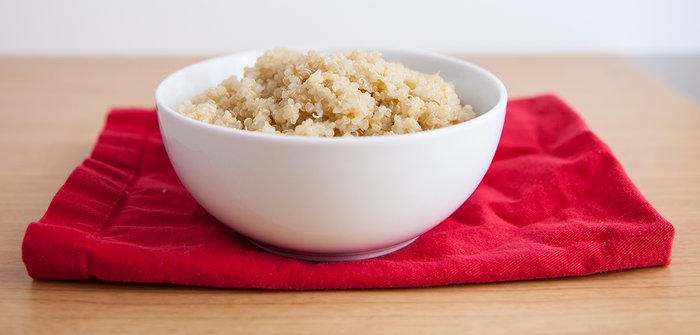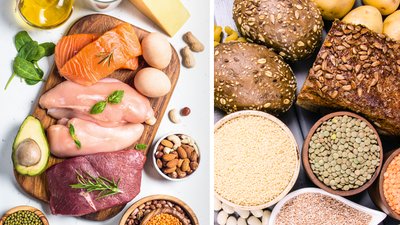If you've recently gone keto, there's a good chance you're counting ketones and carbohydrates obsessively, afraid that the keto police will nab you for consuming even a few extra grams of carbs. If you're exercising, you can stop worrying.
"The reality is that exercise that demands glycogen gives you a bit of a pass to eat more carbs, even on a keto diet," says Diane Sanfilippo, the New York Times bestselling author of "Keto Quick Start: A Beginner's Guide to a Whole-Food Ketogenic Diet." "The fears of being kicked out of ketosis are blown out of proportion relative to the overall impact on health and the ability to burn body fat."
Here, Sanfilippo describes how to mix keto and carbs successfully.
So, eating more carbs won't kill a keto diet?
Keto dieters are afraid of carbohydrates because they believe keto is the only way to lose body fat. They think you must be eating zero carbohydrates in order to get into ketosis, or that if you're not in ketosis 100 percent of the time, it won't work. None of those things are true. Being in ketosis is not a magic key to fat loss. It's a key to better satiety, which can then lead to fat loss. On a keto diet, you don't feel as hungry as you do when you're eating a high-carb, low-fat diet, which means you will eat less.
What is the main reason the diet isn't working?
If you are overweight, you're probably overeating. We tend to crave salt, fat, and sugar—that's how we're wired in today's food landscape. But the goal should be to eat only what we need, and sometimes a bit less, giving our body a chance to burn what's stored.
A big myth of keto is that you're supposed to add a lot of fat to your meals. That's fine for an athlete who isn't trying to lose weight, but for the average person, adding fat beyond what your body needs for energy is what will keep you from losing weight on a keto diet. You'll be in ketosis 100 percent of the time, but you'll be consuming too many calories and you'll never lose a pound.

When people don't lose weight, they often think they're eating too many carbohydrates, but it's not carbs specifically; they're just eating too many calories in general.
How do you add carbs while staying in ketosis?
When you reduce your carbs and replace them with healthy fats, your body ramps up its fat-burning machinery and becomes efficient at burning not just dietary fat but also stored fat for energy. The adaptation process takes around four weeks, so you should follow a strict keto diet for at least that long before making adjustments. You'll go from being hangry to just hungry, but you may have to cut back on your activity level during this period.
Later, if you feel sluggish during your workouts, there are two ways to add carbohydrates to your keto diet without losing the benefits of being in ketosis:
You can eat carbs post-workout. High-intensity exercise pushes your heart rate to 80 percent of your max for an extended period of time. In the post-workout window—30 minutes to 2 hours after activity—your muscles are like squeezed-out sponges, just waiting for the carbs to come in. So, it's a good time to get some extra carbs to replenish the muscle glycogen. Ideally, it should be something starchy rather than something fruity because fructose will preferentially replenish liver glycogen over muscle glycogen. You want that glycogen going to your muscles, and liver glycogen will keep you from being in ketosis.
For a smaller female, 25-30 grams of carbs is fine after exercise. For a larger male, 50-60 grams. That's half a cup to a cup of rice or potato added to a meal. It's not that much, but for someone who is afraid to eat carbohydrates, it will seem like a lot.

You can cycle carbs in, one day per week. If you're an athlete and you don't feel that you need carbs every day—or if you're just a person who wants to make keto a long-term lifestyle—try the cyclical ketogenic diet. On that plan, you eat more carbohydrates one day per week. It's a way to replenish a bit, but it also gives you a break, mentally.
The goal is metabolic flexibility, where you're not scared of not being in ketosis. I don't recommend a pizza and beer bender, but if you want that piece of fruit you've been craving, or some potatoes, or a treat, go for it, up to around 150 grams of carbs. Having your carbs once a week may pause ketosis for a few days, but for an athlete, it's not critical to be in ketosis 100 percent of the time. The benefits of being in ketosis more often than not will far outweigh any damage caused by having a few more carbs one day a week. You'll find that you get back into ketosis right away, and cycling your carbs is a good way to make this lifestyle feel like something you can do long term.
Are there other things you should pay attention to while on a keto diet?
All keto dieters, especially athletes, who experience side effects that are attributed to a lack of carbohydrates need to pay close attention to electrolytes. Fatigue, elevated heart rate, and having trouble sleeping are examples of these symptoms. People are often scared of eating vegetables on keto because of their carb content, but if you don't eat vegetables, you'll be missing out on a lot of electrolytes you could be getting from your food. Leafy greens contain almost no carbohydrates, and because they have calcium and magnesium chloride, they are extremely important for electrolyte balance. If you're eating only beef, cheese, and bacon, you'll get your sodium, but you won't get the other minerals you need.
Who should consider trying a keto diet?
Keto is perfect for endurance athletes. Endurance athletes operate at a moderate intensity for long periods of time. Moderate exercise is not glycogen-dependent and so is very ideally fueled by fat, but keto-adapted athletes don't have to go all-or-nothing with carbohydrates. An endurance athlete can fill up on 100 grams of carbs, burn through them, and then switch over to burning fat because their body is so well adapted to ketosis. That's what keeps you from bonking. It's the reason that many people carry energy gel packets. If you're not adapted to burning ketones, you have no shot at tapping into body fat for fuel—and body fat can run you a lot longer than glycogen.
For more information on sports nutrition and supplementation, check out the Foundations of Fitness Nutrition course on Bodybuilding.com BodyFit Elite.

